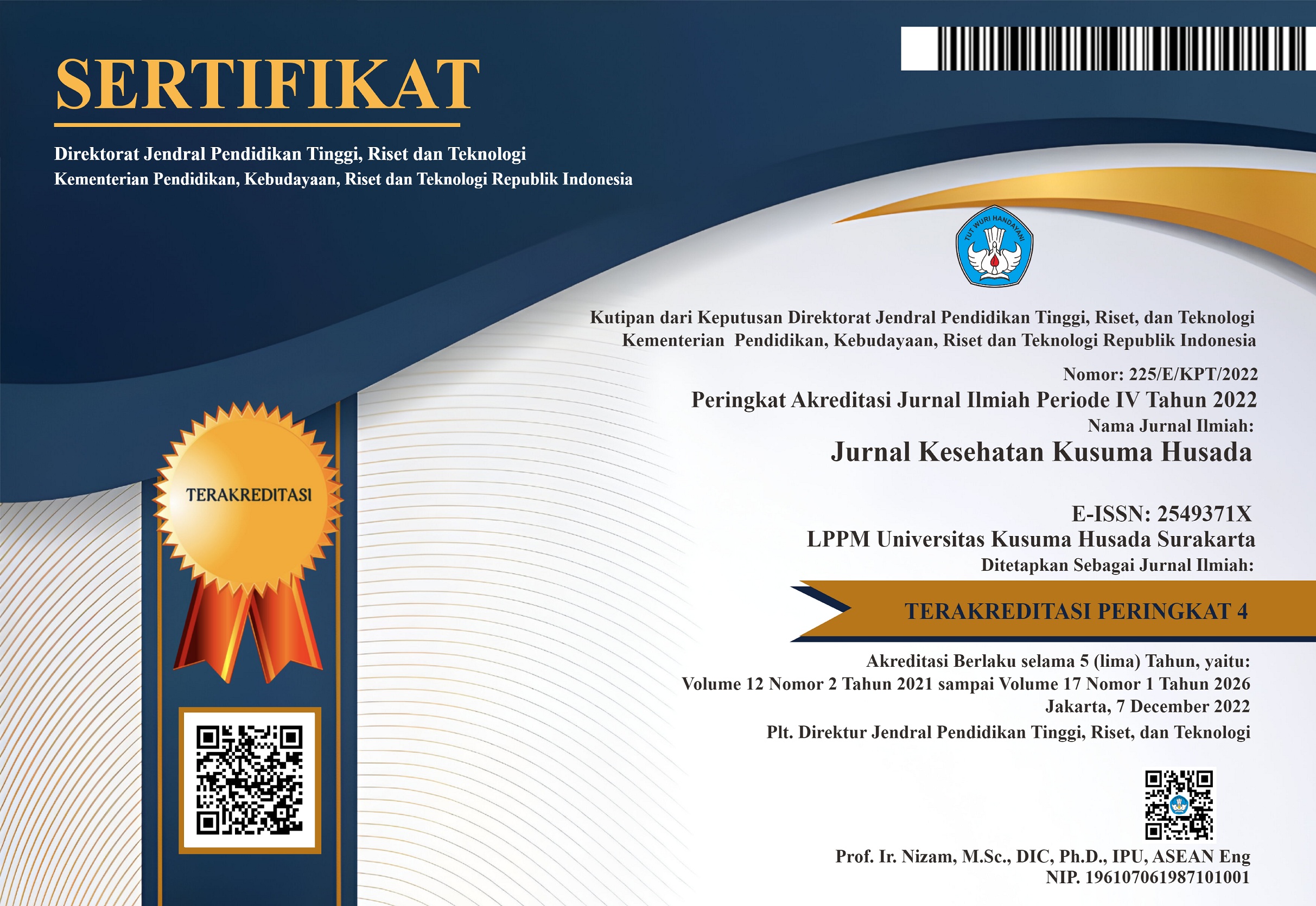DUKUNGAN KELUARGA TERHADAP PERAWATAN PALLIATIVE PADA PASIEN CA MAMAE
Abstract
Keluarga dalam merawat klien yang memerlukan palliative care harus mempunyai pengetahuan tentang kemampuan dalam mengenal masalah, mengambil keputusan, merawat, memodifikasi lingkungan dan memanfaatkan layanan kesehatan yang ada di sekitarnya. Tujuan penelitian ini untuk mengeksplorasi dukungan keluarga terhadap perawatan palliative pada pasien Ca mamae dirawat di rumah sakit. Penelitian ini merupakan penelitian kualitatif dengan pendekatan fenomenologi. Teknik pengumpulan data yang digunakan yaitu dengan cara indept interview dan validasi hasil penelitian ini menggunakan member checking. Peneliti melaksanakan penelitian ini pada bulan Juli - Agustus 2020. Partisipan sejumlah 4 orang dengan kriteria inklusi keluarga yang merawat penderita Ca mamae stadium akhir dirawat di Rumah Sakit, serta bersedia menjadi responden. Metode analisa ini menggunakan analisa Colaizi. Hasil analisis data didapatkan empat tema, yaitu: (1) Awal mula keluarga mengetahui pasien terdiagnosis Ca Mamae, (2) Persepsi keluarga mengenai Ca Mamae, (3) Dukungan keluarga dalam memenuhi kebutuhan pada pasien Ca mamae (4) Beban dan hambatan keluarga dalam merawat pasien dirumah sakit. Kesimpulan dalam penelitian menunjukkan bahwa awal mula keluarga mengetahui pasien terdiagnosis Ca mamae yaitu tanda gejala dan kronologi pasien. Persepsi keluarga mengenai Ca mamae terdiri atas pengertian dan pencegahan Ca mamae. Dukungan kelurga dalam memenuhi kebutuhan pada pasien yaitu pemenuhan kebutuhan fisik, sosial, psikologis dan spiritual, namun terdapat hambatan yang dirasakan keluarga dalam merawat dirumah sakit.
Families in caring for clients who need palliative care must have knowledge of the ability to recognize problems, make decisions, care for, modify the environment and take advantage of the health services around them. The purpose of this study was to explore family support for palliative care in Ca mamae patients hospitalized. This research is qualitative research with a phenomenological approach. The data collection technique used is by means of in-depth interviews and validation of the results of this study using member checking. Researchers carried out this study in July - August 2020. The participants were 4 people with family inclusion criteria who cared for patients with end-stage Ca mammae who were hospitalized and were willing to be respondents. This analysis method uses Colaizi analysis. The results of data analysis obtained four themes, namely: (1) The beginning of the family knowing the patient was diagnosed with Ca Mamae, (2) Family perception of Ca Mamae, (3) Family support in meeting the needs of the Ca Mamae patient (4) Burden and family barriers in caring for patients in the hospital. This study concluded that, in the beginning, the family knew that the patient was diagnosed with Ca mammary, namely the signs and symptoms of the patient and the chronology of the patient. The family's perception of Ca mamae consists of understanding and preventing Ca mamae. Family support in meeting the needs of the patient, namely the fulfillment of physical, social, psychological, and spiritual needs, there are obstacles felt by the family in caring for the hospital.
Copyright (c) 2022 Jurnal Kesehatan Kusuma Husada

This work is licensed under a Creative Commons Attribution 4.0 International License.
The copyright of the published articles belongs to Jurnal Kesehatan Kusuma Husada.

This work is licensed under a Creative Commons Attribution 4.0 International License.











